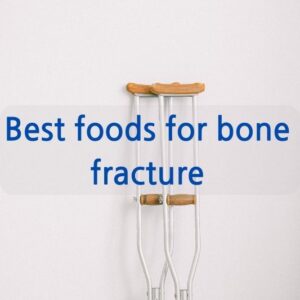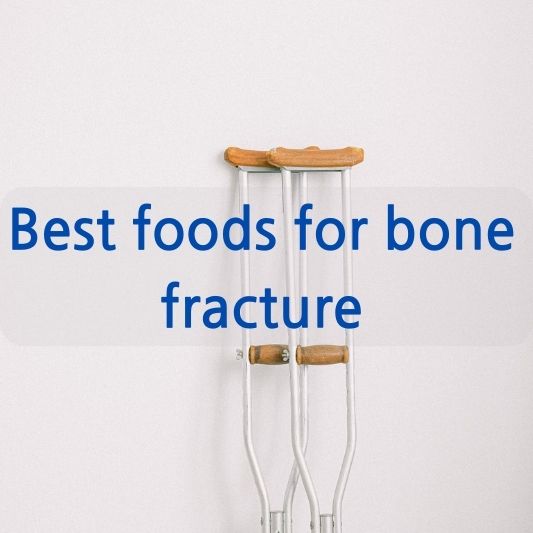Bone fracture is a medical condition in which a bone breaks. When a bone fracture occurs, the body needs to repair the damaged bone. This process can take several weeks or even months. During this time, it is important to eat a healthy diet that includes foods that are good for bones.

Here are some of the best foods for bone fracture:
Calcium-rich foods: Calcium is an essential nutrient for bone health. It helps to build and strengthen bones. Good sources of calcium include milk, cheese, yogurt, tofu, and sardines.
- Vitamin D-rich foods: Vitamin D helps the body absorb calcium. Good sources of vitamin D include oily fish, egg yolks, and fortified foods such as milk and cereal.
- Vitamin K-rich foods: Vitamin K is important for blood clotting and bone health. Good sources of vitamin K include leafy green vegetables such as kale, spinach, and broccoli.
- Protein-rich foods: Protein is essential for bone health. It helps to build and repair bones. Good sources of protein include meat, fish, poultry, eggs, beans, and lentils.
- Magnesium-rich foods: Magnesium is important for bone health. It helps to regulate calcium levels in the body. Good sources of magnesium include nuts, seeds, and leafy green vegetables.
- Zinc-rich foods: Zinc is important for bone health. It helps to promote bone growth and repair. Good sources of zinc include meat, seafood, beans, and nuts.
It is important to eat a variety of these foods to get the nutrients your body needs to heal a bone fracture. You should also make sure to get enough sunlight, as sunlight helps the body produce vitamin D.
Here are some examples of healthy meals that you can eat if you have a bone fracture:
- Breakfast: Oatmeal with milk and berries, or yogurt with granola and fruit
- Lunch: Salad with grilled chicken or fish, or soup and sandwich
- Dinner: Salmon with roasted vegetables, or tofu stir-fry
- Snacks: Nuts, seeds, fruits, or yogurt
If you have any questions about what foods are good for bone fracture, you should talk to your doctor or a registered dietitian.
conclusion
eating a nutritious diet rich in calcium, vitamin D, vitamin K, protein, magnesium, and zinc is crucial for supporting bone healing and recovery after a fracture. Aim for a variety of these foods throughout the day, focusing on balanced meals and healthy snacks. Remember, adequate sunlight exposure promotes vitamin D production, further aiding the healing process. If you have any concerns about your diet or need specific recommendations, consult your doctor or a registered dietitian for personalized guidance. By providing your body with the necessary nutrients, you can facilitate a smoother and faster bone fracture recovery, paving the way for stronger, healthier bones in the long run. Take care, and best wishes for a swift and complete recovery!
FAQs
How much calcium do I need for bone fracture healing?
Adults typically need around 1,000 milligrams of calcium per day, but this amount may increase to 1,200-1,500 milligrams for those recovering from bone fractures.
How much vitamin D do I need for bone fracture healing?
The recommended daily intake of vitamin D for adults is 600 IU (international units), but individuals with bone fractures may need more. Your doctor can advise you on the appropriate dosage.
What are some other nutrients that are important for bone health?
Protein, magnesium, and zinc are also important for bone health.
Are there any foods I should avoid if I have a bone fracture?
It’s generally recommended to avoid excessive amounts of alcohol, caffeine, and processed foods, as they can interfere with bone healing.
How long does it take for a bone fracture to heal?
It depends on the severity of the fracture, but healing typically takes several weeks to months.
What can I do to speed up bone fracture healing?
In addition to eating a healthy diet, you can also:
- Get enough rest
- Elevate the injured area
- Apply ice packs to reduce swelling
- Do gentle exercises as recommended by your doctor
When should I see a doctor about a bone fracture?
See a doctor immediately if you experience any of the following:
- Severe pain
- Swelling
- Deformity
- Inability to bear weight on the injured limb
- Numbness or tingling in the injured area
Can I take supplements to help with bone fracture healing?
Talk to your doctor before taking any supplements, as they may not be necessary or could interact with other medications you are taking.
Find out the price of nutritional supplements that help bone health on iHerb!
